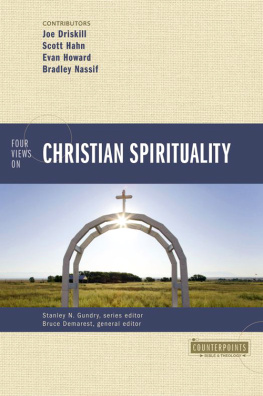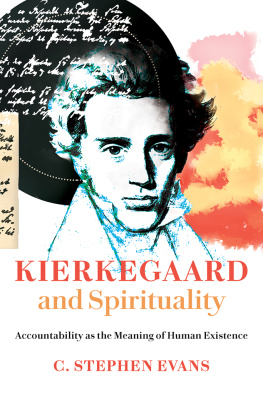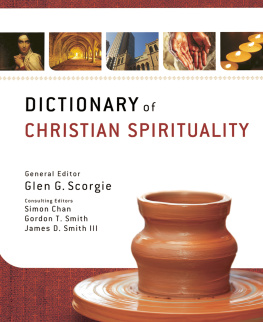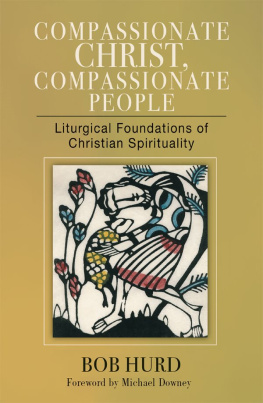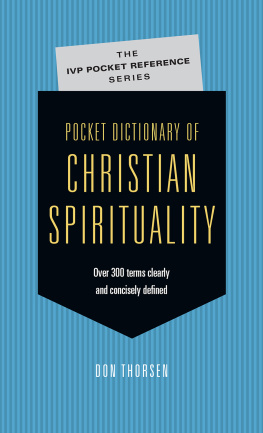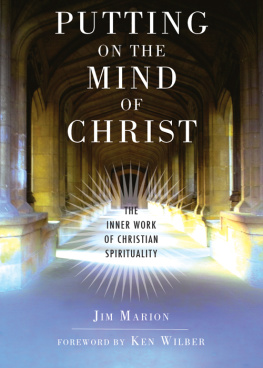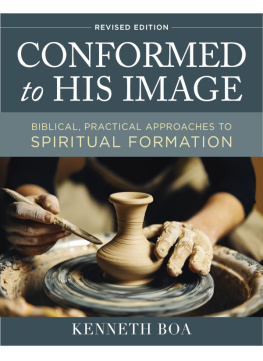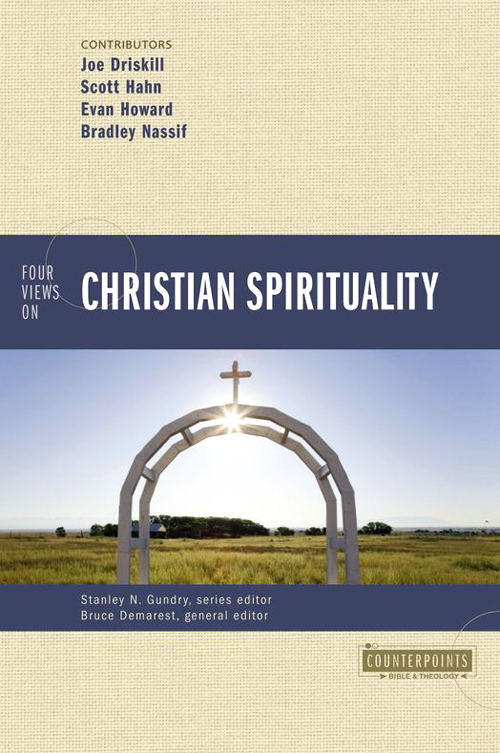Joseph D. Driskill
Stanley N. Gundry, series editor
SIMON CHAN
I n recent years, we have seen a surge of interest in spirituality among evangelicals that has continued unabated. Most works on spirituality, however, have tended to build on a specific tradition. This is understandable, since spirituality is the lived dimension of the Christian faith, and the faith is always expressed through specific traditioning communities. Sometimes a particular spiritual practice may become closely associated with a particular spiritual tradition. For example, when it comes to spiritual guidance, many modern Christians tend to associate it with the desert fathers and Ignatius Loyola. Similarly, Christians seeking a more intensely personal and supernaturalistic form of spirituality have turned to the Pentecostal/charismatic churches. But seldom do we have a book that compares the major Christian spiritual traditions in such a way that their respective contours are sharply defined. The value of this approach is that readers unacquainted with these spiritual traditions are given a faithful and succinct introduction, and those who are more knowledgeable will be able to appreciate the finer nuances.
The contributors are intimately familiar with the spiritual traditions they represent. The essential features of Catholic, Orthodox, evangelical, and mainline Protestant spiritualities are expertly fleshed out and seen at their best. What they have given us are four rather winsome portraits of Christian spiritualities, while the responses to each from the other three enable readers to see where these spiritualities converge and diverge.
The resulting pictures allow us to make comparisons and contrasts in various configurations. For example, if we compare Eastern and Western spiritualities as they are given here, Western Christianity, both Catholic and Protestant, tends to emphasize the salvific work of Christ, while Eastern Orthodoxy sees Christs work as going beyond restoring what was lost through the fall to include bringing humanity to where it never was before the fall, namely, growth into fuller communion with the triune God. The central motif of Orthodoxy is communion, while the central motif of Western Christianity is salvation.
Again, while both evangelical and Orthodox spiritualities are gospel centered, there are distinct differences in the way each understands the gospel. For the evangelical, the gospel is largely focused on the person of Jesus Christ and his salvific work on the cross, whereas for the Orthodox, Jesus Christ is always seen in relation to the Trinity, and the gospel is about the whole story of Christ from his conception to his second coming. Further, for evangelicals, the Christian life is more about the individuals relationship with God, whereas for the Orthodox and Catholic, it is about life in a community shaped by Scripture and the living tradition expressed supremely in the liturgy.
In Catholic spirituality, the dominant image is the family, and the key figure in the triune family is the Father, who through his Son makes us sons in the Son. Thus the church is seen as the extension of the Trinitarian family, and the earthly family as imaging the church. In evangelical spirituality, by contrast, the Father is hardly mentioned; rather, the focus is on Jesus and what it means to be personally related to him, especially through his redemptive work on the cross.
Progressive mainline Protestant spirituality stands in an interesting relation to the other three. As Joseph Driskill himself has observed, Mainline Protestant spirituality seems more vulnerable and more in need of changing course than the other interlocutors because of its enmeshment with the modern worldview. Its main resources for change are social institutions, whereas for the others, the resources are essentially spiritual. In contrast to evangelicalism, which stresses the individuals relationship with God, progressive Protestantism stresses the social and structural dimensions of life. Unlike Catholicism, which also stresses the role of the church in individual and corporate transformation, mainline progressives rely largely on social institutions to do it. And in contrast to Orthodoxy, progressive Protestantism centers the work of the kingdom of God in the created order, whereas Orthodoxy centers it in the ecclesial community.
These few examples give us a hint of what this book seeks to accomplish. But beyond helping us appreciate the similarities and differences, the strengths and weaknesses, the exchanges between the interlocutors also highlight at least three other important implications. First, they show that our common Trinitarian confession has spiritual ramifications too large to be adequately captured by any one spiritual tradition. If that is the case, then, second, the mutual critique and appreciation should lead to self-correction and transformation from within. Third, the awareness of each others strengths and weaknesses should serve to motivate all toward a more holistic and ecumenical spirituality. Hopefully, evangelicals will come away with a better grasp of Catholic comprehensiveness, Catholics and Orthodox Christians with a fresh injection of evangelical fervor, and mainline Protestants with both.
Simon Chan (PhD, Cambridge) is Earnest Lau professor of systematic theology at Trinity Theological College in Singapore. He is the author of several books, including Pentecostal Theology and the Christian Spiritual Tradition, Spiritual Theology: A Systematic Study of the Christian Life, and Liturgical Theology: The Church as Worshiping Community.
BRUCE DEMAREST
A prominent feature of our times is the robust revival of spirituality, both Christian and non-Christian. Researchers have developed spiritualities of women, men, marriage, children, midlife, the workplace, leisure, suffering, the Eucharist, and so on. Dissatisfaction with materialism and consumerism, as well as with formal institutional religion, have all contributed to this trend. Economic crises, ecological calamities, and worldwide terrorism have intensified the search for ultimate reality, meaning, and security.
Seeking to nurture their souls, many people are attending seminars on life enrichment, gathering in prayer and meditation groups, attending conferences and workshops on the spiritual life, and receiving spiritual direction. A plethora of books and periodicals explore sacred terrain and spiritual experience. Popular works on spirituality are hot-ticket items, outselling most other categories of books. Scholarly organizations such as The Society for the Study of Christian Spirituality and journals such as Spiritus and the Journal of Spiritual Formation and Soul Care creatively engage spirituality on an academic level. In addition, a growing number of programs in spirituality and formation are offered by colleges and seminaries. Moreover, local and national parachurch organizations have formed around spiritual emphases. Websites devoted to spirituality further fuel interest in the subject. The spirituality sprawl evidenced in both the church and the culture has led to a tsunami of options available to seekers of all stripes.

